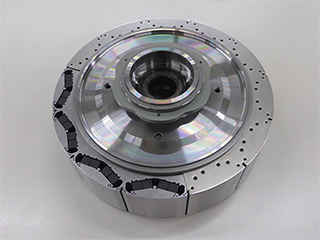
A rotor for the i-DCD drive motor, using rare earth metal-free magnets. (credit: Honda)
Honda said on Tuesday that it had created the first commercial hybrid-electric vehicle motor without using any heavy rare earth metals. (Rare earth metals are often divided into “heavy” and “light” categories.) Working with the expertise of Daido Steel Co., Honda’s new motor will appear in this year’s Honda Freed, a hybrid minivan sold in Japan.
Rare earth metals are essential to making a plethora of items, including smartphones, laptops, missiles, and electric cars. Unfortunately, that group of elements are at risk of shortage, and many of them are mined predominantly in China, adding a special political flavor to ensuring a global supply for industry. In 2009, Reuters reported that Toyota, maker of the popular hybrid-electric Prius, risked suffering at the hands of a rare earth metal shortage. And in 2010, China temporarily banned exports of rare earth metals to Japan during a standoff over territory.
The Japanese automaker bristled at that turn of events. Although Honda told Reuters that it started looking into ways to reduce rare earth metal use a decade ago, the recent risk of shortage and the growing popularity of hybrid vehicles spurred the company to look more seriously into ways to "avoid resource-related risks and diversify channels of procurement,” according to a Honda press release.







